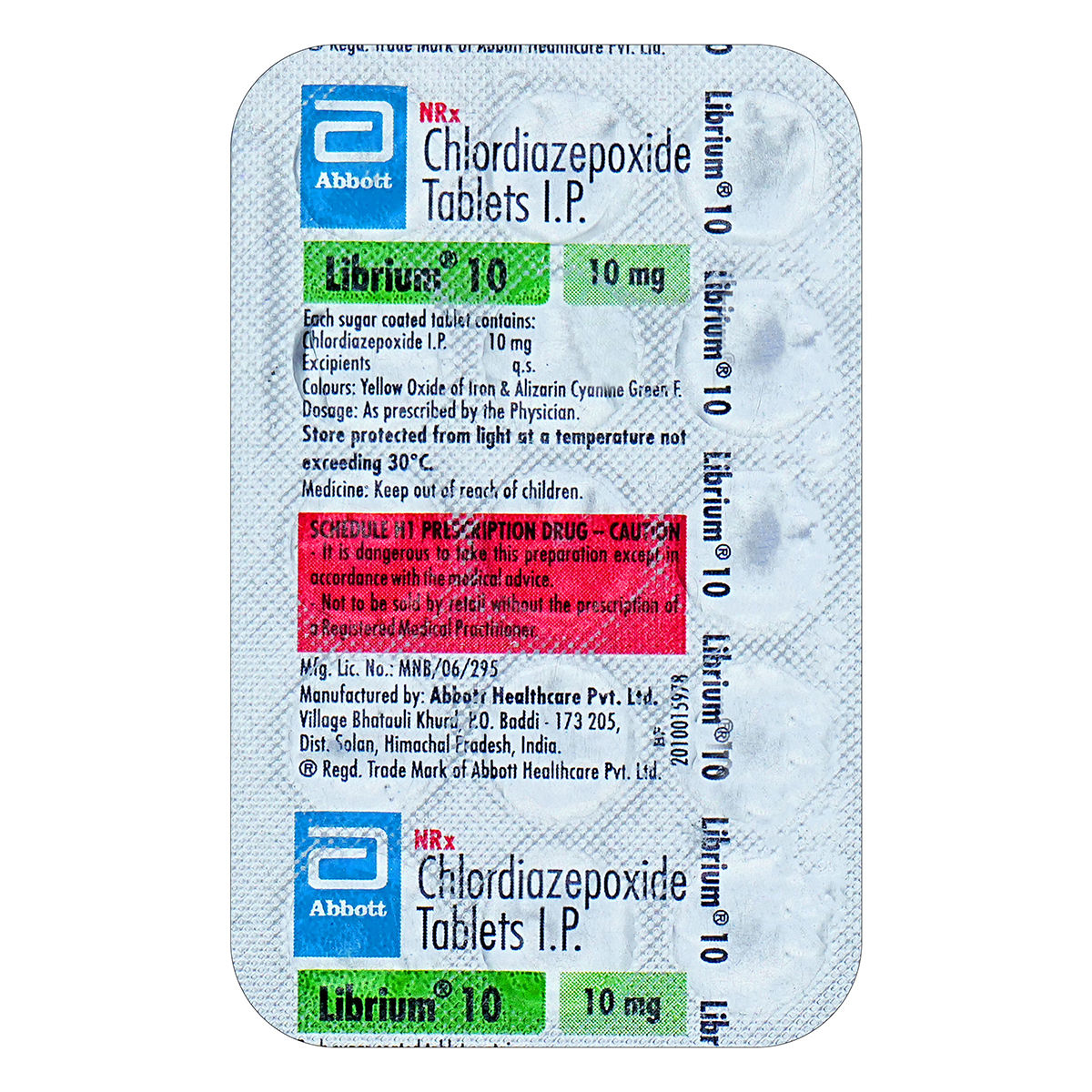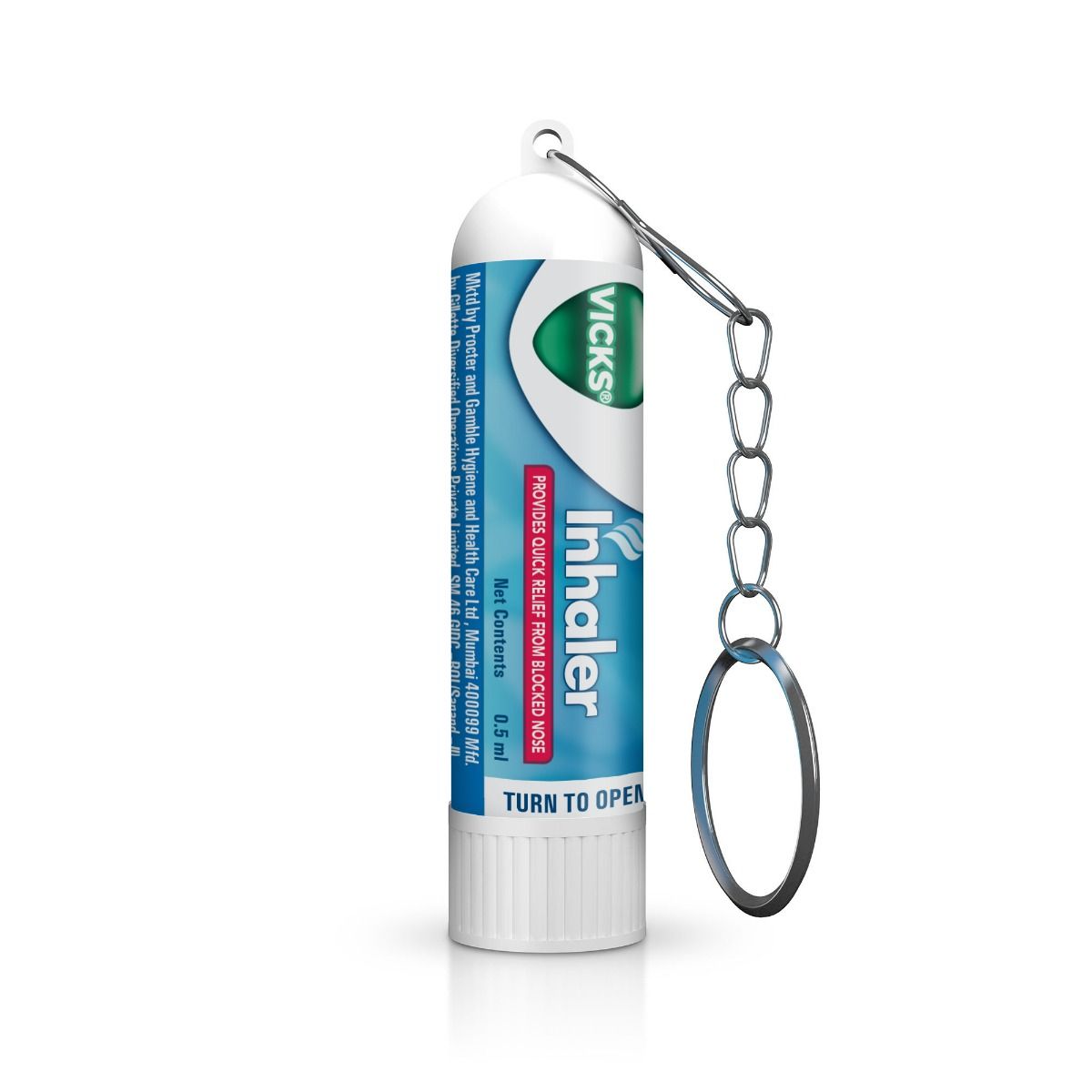Librium 10 Tablet 10's

₹70.2*
MRP ₹78
10% off
₹66.3*
MRP ₹78
15% CB
₹11.7 cashback(15%)
Free Delivery
With Circle membership
(Inclusive of all Taxes)
This offer price is valid on orders above ₹800. Apply coupon PHARMA10/PHARMA18 (excluding restricted items)
Librium 10 Tablet is used to provide relief from mild to moderate pain and inflammation associated with musculoskeletal pain. It contains Flupirtine, which exerts dual effects by relaxing muscles and treating pain. It works by blocking the signals responsible for the sense of pain and inflammation. In some cases, it may cause common side effects like dizziness, drowsiness, pruritus (itchy skin), dry mouth and gastric fullness, nausea and muscle tremor. Before taking this medicine, you should tell your doctor if you are allergic to any of its components or if you are pregnant/breastfeeding, and about all the medications you are taking and pre-existing medical conditions.
Know Your Delivery Time
Provide Delivery Location
Selected Pack Size:10
10 ₹70.2
(₹7.02 per unit)
Out of stock
15 ₹140.4
(₹9.36 per unit)
Out of stock
Available Offers
 Prescription drug
Prescription drugWhats That

Secure Payment

India's Most Trusted Pharmacy

Genuine Products
Composition :
Manufacturer/Marketer :
Consume Type :
Return Policy :
Expires on or after :
About Librium 10 Tablet
Librium 10 Tablet is indicated for the management of anxiety disorders. Additionally, Librium 10 Tablet is used for the short-term relief of muscle spasms, symptoms of alcohol withdrawal, anxiety-causing insomnia or distress, and anxiety occurring with mental health problems.
Librium 10 Tablet contains ‘Chlordiazepoxide’, which works by increasing the action of a chemical messenger called GABA. This helps suppress the excessive and abnormal activity of the nerve cells in the brain. Thereby, Librium 10 Tablet helps in treating anxiety.
You are advised to take Librium 10 Tablet for as long as your doctor has prescribed it for you, depending on your medical condition. In some cases, you may experience certain common side effects such as drowsiness, light-headedness, dizziness, sedation, slurred speech, lack of coordination, ataxia (unsteadiness and clumsiness), difficulty in controlling movements, and dependence. You are advised to talk to your doctor if you experience these side effects persistently.
Avoid taking Librium 10 Tablet if you are pregnant or planning for pregnancy, as it may harm the fetus. Librium 10 Tablet may pass into breastmilk, so avoid taking Librium 10 Tablet if you are breastfeeding. Avoiding or handling machinery as Librium 10 Tablet may cause drowsiness, impaired concentration, blurred vision, and impaired muscular function. Avoid consumption of alcohol while taking Librium 10 Tablet as it may cause increased drowsiness. Librium 10 Tablet should not be given to children as safety and effectiveness were not established.
Uses of Librium 10 Tablet
• Anxiety Management: Librium 10 Tablet helps to manage anxiety symptoms by enhancing GABA's calming effects in the body.
• Alcohol Withdrawal: Librium 10 Tablet is used to manage alcohol withdrawal symptoms like agitation, anxiety, and tremors.
• Muscle Relaxation: Librium 10 Tablet helps to relax muscles by calming the central nervous system, relieving muscle spasms.
• Preoperative Sedation: In some cases, Librium 10 Tablet can be used as a preoperative sedative to calm anxiety and relax patients before surgery.
• Sleep Disorders: Librium 10 Tablet is also involved in treating sleep issues related to anxiety or stress by providing a sedative effect.
Directions for Use
Swallow Librium 10 Tablet as a whole with a glass of water; do not chew or crush it.
Medicinal Benefits
Librium 10 Tablet belongs to a group of medicines called benzodiazepine anxiolytics. Librium 10 Tablet is indicated for the management of anxiety disorders. Additionally, Librium 10 Tablet is used for the short-term relief of muscle spasms, symptoms of alcohol withdrawal, anxiety-causing insomnia or distress, and anxiety occurring with mental health problems. Librium 10 Tablet works by increasing the action of a chemical messenger called GABA. This helps suppress the excessive and abnormal activity of the nerve cells in the brain. Thereby, Librium 10 Tablet helps in treating anxiety.
How Librium 10 Tablet Works
Storage
- Uncoordinated muscle movements need immediate medical attention.
- Observe your movements and try to understand and control the particular movement.
- Regularly do strengthening exercises to improve blood flow throughout the body and avoid involuntary movements.
- Implement massage techniques to enhance blood flow to organs.
- Take a balanced diet and quit smoking.
- Practice yoga and meditation to improve thought processes and reduce uncontrolled and involuntary movements.
- Confusion is a major psychotic disorder that needs immediate medical attention.
- Acknowledge your experience and put effort to control confusion.
- Avoid smoking and alcohol intake as it can worsen the condition and increase your confusion.
- Practice meditation and yoga to avoid anxiety, which can be one of the leading causes.
- Talk to your dietician and consume food that can improve your mental health.
- Inform your doctor about dizziness symptoms. They may adjust your medication regimen or prescribe additional medications to manage symptoms.
- Follow your doctor's instructions for taking medication, and take it at the same time every day to minimize dizziness.
- When standing up, do so slowly and carefully to avoid sudden dizziness.
- Avoid making sudden movements, such as turning or bending quickly, which can exacerbate dizziness.
- Drink plenty of water throughout the day to stay hydrated and help alleviate dizziness symptoms.
- If you're feeling dizzy, sit or lie down and rest until the dizziness passes.
- Track when dizziness occurs and any factors that may trigger it, and share this information with your doctor to help manage symptoms.
- Avoid driving or operating machinery or activities that require high focus until you know how the medication affects you.
- Maintain a fixed sleeping schedule, create a relaxing bedtime routine and ensure your sleeping space is comfortable to maximize your sleep quality.
- Limit alcohol and caffeine as these may worsen drowsiness and disturb sleep patterns.
- Drink plenty of water as it helps with alertness and keeps you hydrated and for overall well-being.
- Moderate physical activity can improve energy levels, but avoid intense workouts right before bedtime.
- Avoid driving or operating machinery or activities that require high focus until you know how the medication affects you.
- Maintain a fixed sleeping schedule, create a relaxing bedtime routine and ensure your sleeping space is comfortable to maximize your sleep quality.
- Limit alcohol and caffeine as these may worsen drowsiness and disturb sleep patterns.
- Drink plenty of water as it helps with alertness and keeps you hydrated and for overall well-being.
- Moderate physical activity can improve energy levels, but avoid intense workouts right before bedtime.
- Perform balance exercises like heel raises, standing on one leg, and weight shifts with the guidance of a physical therapist.
- Focus on strengthening leg muscles and core muscles for better stability.
- Stay hydrated by drinking plenty of water as dehydration may lead to unsteadiness and dizziness.
- Wear low-heeled shoes with good tread for better grip.
- Change your surroundings by removing tripping hazards like clutter, loose rugs and poorly lit areas.
- Avoid sudden position changes; stand up slowly and take your time to move around.
- Watch out for rapid head movements that might trigger dizziness.
- Rest well; get enough sleep.
- Eat a balanced diet and drink enough water.
- Manage stress with yoga and meditation.
- Limit alcohol and caffeine.
- Physical activities like walking or jogging might help boost energy and make you feel less tired.
What if I have taken an overdose of Librium 10 Tablet
Drug Warnings
Do not take Librium 10 Tablet if you are allergic to any of its contents; if you have reduced blood flow to the lungs, breathing problems, obsessional stress, hallucinations, delusions, sleep apnoea (stopping breathing while asleep), severe liver disorder, myasthenia gravis (muscle weakness), spinal or cerebral ataxia. Inform your doctor if you have long-term lung, kidney or liver disorder, schizophrenia, mania, history of drug abuse or alcoholism. Librium 10 Tablet may be habit-forming, so inform your doctor if you have a history of drug addiction or abuse. Keep your doctor informed about all the medicines you are taking, including prescription, non-prescription medicines and herbal supplements. Please do not stop taking Librium 10 Tablet on your own as it might cause withdrawal symptoms. Avoid taking Librium 10 Tablet if you are pregnant or planning for pregnancy as it may cause harm the fetus. Librium 10 Tablet may pass into breastmilk, so avoid taking Librium 10 Tablet if you are breastfeeding.
Drug-Drug Interactions
Drug-Drug Interactions
Login/Sign Up
Taking Librium 10 Tablet with Sodium oxybate increases the risk of breathing difficulty or low blood pressure.
How to manage the interaction:
Taking Librium 10 Tablet with Sodium oxybate is generally avoided as it can lead to an interaction, it can be taken if prescribed by a doctor. However, if you experience dizziness, shortness of breath, excessive sweating, or blurred vision, contact your doctor. Do not discontinue any medications without consulting a doctor.
Coadministration of Buprenorphine with Librium 10 Tablet can increase the risk or severity of side effects like decreased breathing rate, irregular heart rhythms, or problems with movement and memory.
How to manage the interaction:
Taking buprenorphine and Librium 10 Tablet together can result in an interaction, it can be taken if a doctor has advised it. However, if you experience drowsiness, shortness of breath, palpitations, numbness in hands and feet, or hypersensitivity to light and noise, consult a doctor immediately. Do not discontinue any medications without consulting a doctor.
Co-administration of pentazocine with Librium 10 Tablet can increase the risk of side effects like decreased breathing rate, irregular heart rhythms, or problems with movement and memory.
How to manage the interaction:
Taking pentazocine and Librium 10 Tablet together can result in an interaction, it can be taken if your doctor has advised it. However, if you experience any symptoms such as dizziness, shortness of breath, numbness in hands and feet, or palpitations, consult a doctor immediately. Do not discontinue any medications without consulting a doctor.
Co-administration of Esketamine with Librium 10 Tablet can increase the risk of side effects.
How to manage the interaction:
Taking esketamine and Librium 10 Tablet together can result in an interaction, it can be taken if your doctor has advised it. However, if you experience drowsiness, confusion, breathing difficulty, or palpitations, consult a doctor immediately. Do not discontinue any medications without consulting a doctor.
Co-administration of Sufentanil with Librium 10 Tablet can increase the risk of side effects.
How to manage the interaction:
Taking sufentanil and Librium 10 Tablet together can result in an interaction, it can be taken if your doctor has advised it. However, if you experience rapid breathing, muscle weakness, dizziness, and palpitations, consult a doctor immediately. Do not discontinue any medications without consulting a doctor.
Co-administration of butorphanol with Librium 10 Tablet can increase the risk of side effects like decreased breathing rate, irregular heart rhythms, or problems with movement and memory.
How to manage the interaction:
Taking butorphanol and Librium 10 Tablet together can result in an interaction, it can be taken if your doctor has advised it. However, if you experience drowsiness, shortness of breath, palpitations, numbness in hands and feet, or hypersensitivity to light and noise, consult a doctor immediately. Do not discontinue any medications without consulting a doctor.
Co-administration of remifentanil with Librium 10 Tablet may significantly lead to adverse effects such as respiratory difficulties, and unconsciousness.
How to manage the interaction:
Taking remifentanil and Librium 10 Tablet together can result in an interaction, it can be taken if your doctor has advised it. However, if you experience any symptoms such as dizziness, shortness of breath, palpitations, numbness in hands and feet, or headache, consult a doctor immediately. Do not discontinue any medications without consulting a doctor.
Using Tapentadol with Librium 10 Tablet can increase the risk of side effects like decreased breathing rate, irregular heart rhythms, or problems with movement and memory.
How to manage the interaction:
Taking tapentadol and Librium 10 Tablet together can result in an interaction, it can be taken if your doctor has advised it. However, if you experience any symptoms such as dizziness, shortness of breath, numbness in hands and feet, or palpitations, consult a doctor immediately. Do not discontinue any medications without consulting a doctor.
Co-administration of hydromorphone with Librium 10 Tablet may significantly lead to adverse effects such as respiratory difficulties, and brain related isuues.
How to manage the interaction:
Taking hydromorphone and Librium 10 Tablet together can result in an interaction, it can be taken if your doctor has advised it. However, if you experience any symptoms such as dizziness, drowsiness, or difficulty concentrating, numbness and tingling of extremities, or hypersensitivity to light and noise, consult a doctor immediately. Do not discontinue any medications without consulting a doctor.
Co-administration of Flumazenil with Librium 10 Tablet can increase the risk of developing fits.
How to manage the interaction:
Taking flumazenil and Librium 10 Tablet together can result in an interaction, it can be taken if your doctor has advised it. However, if you experience dizziness, drowsiness, difficulty concentrating, or blurred vision, consult a doctor immediately. Do not discontinue any medications without consulting a doctor.
Drug-Food Interactions
Drug-Food Interactions
Login/Sign Up
Diet & Lifestyle Advise
Attend therapy sessions regularly.
Eat a healthy diet.
Try to stay active and exercise regularly.
Take ample rest. Get enough sleep.
Meditate regularly as it helps in easing anxiety.
Avoid smoking, caffeine, and alcohol consumption.
Foods and drinks like salmon, chamomile, turmeric, dark chocolate, green tea, and yoghurt may help with anxiety.
Habit Forming
Therapeutic Class
Librium 10 Tablet Substitute

Librium 10 mg Tablet 15's
by AYUR
₹9.36per tabletEquilibrium Tablet 15's
by Others
₹5.73per tabletEQUILIBRIUM 10MG TABLET
by Others
₹5.18per tabletANXON TABLET
by Others
₹5.76per tabletAnxide-10 Tablet 10's
by Others
₹4.90per tablet
Product Substitutes
Alcohol
Unsafe
Avoid consumption of alcohol while taking Librium 10 Tablet as it may cause increased drowsiness.
Pregnancy
Unsafe
Librium 10 Tablet belongs to pregnancy category D. Avoid taking Librium 10 Tablet if you are pregnant or planning for pregnancy as Librium 10 Tablet may cause damage to the foetus.
Breast Feeding
Unsafe
Do not take Librium 10 Tablet if you are breastfeeding as Librium 10 Tablet may pass into breastmilk.
Driving
Unsafe
Avoid driving as Librium 10 Tablet may cause drowsiness, impaired concentration, blurred vision, and impaired muscular function.
Liver
Caution
Please consult your doctor before taking Librium 10 Tablet if you have a liver impairment or any concerns regarding this.
Kidney
Caution
Please consult your doctor before taking Librium 10 Tablet if you have kidney impairment or any concerns regarding this.
Children
Unsafe
Librium 10 Tablet should not be given to children as safety and effectiveness were not established.

Have a query?
FAQs
Librium 10 Tablet is indicated for the management of anxiety disorders. Additionally, it is used for the short-term relief of muscle spasms, symptoms of alcohol withdrawal, anxiety-causing insomnia or distress, and anxiety occurring with mental health problems.
Librium 10 Tablet works by increasing the action of a chemical messenger called GABA. This helps suppress the excessive and abnormal activity of the nerve cells in the brain. Thereby, Librium 10 Tablet helps in treating anxiety.
Do not stop taking Librium 10 Tablet on your own as it might cause withdrawal symptoms such as headache, muscle pain, anxiety, tension, nervousness, restlessness, sweating, irritability, and confusion. Consult your doctor if you experience any difficulty while taking Librium 10 Tablet , and the doctor may reduce the dose gradually.
Librium 10 Tablet may cause dependence in patients taking Librium 10 Tablet at higher doses for longer durations, with a history of drug abuse or alcoholism. Therefore, take Librium 10 Tablet only as prescribed.
Librium 10 Tablet may cause partial memory loss. To lower this risk, you are recommended to have an uninterrupted sleep of at least 7-8hours.
Do not take Librium 10 Tablet of longer durations as it is a habit-forming drug. Librium 10 Tablet is generally prescribed only for 2-4week treatment. Take Librium 10 Tablet only as prescribed and do not stop taking Librium 10 Tablet suddenly.
Librium 10 Tablet is used to provide short-term relief from the symptoms of alcohol withdrawal. Alcohol withdrawal is the body's changes when a person abruptly stops consuming alcohol after heavy and prolonged alcohol use.
Yes, Librium 10 Tablet is an effective medication used to treat anxiety disorders and additionally provide short-term relief of muscle spasms, symptoms of alcohol withdrawal, and anxiety causing mental health problems. It works by increasing the action of GABA, a chemical messenger in the brain, which helps calm excessive and abnormal nerve cell activity.
Xanax (alprazolam) and Librium 10 Tablet are both benzodiazepines and work effectively. These medications offer unique benefits and are tailored to different needs. Despite their significant similarities, each has distinct characteristics: Librium 10 Tablet , the first benzodiazepine, provides a more extended effect, while Xanax, a short-acting drug with a short half-life, is designed for rapid relief during a panic attack. However, your doctor will choose the best medication based on your physical and mental health needs.
No known interactions exist between Librium 10 Tablet and ibuprofen. However, do not take them together unless advised by your doctor, who will assess the risks and benefits and provide personalized guidance.
Librium 10 Tablet may cause sleep or drowsiness, a common side effect in some individuals. To ensure your safety, rest for a while after taking the medication and avoid driving or operating heavy machinery. Sleepiness or drowsiness subsides in most cases as your body adjusts to the medication. However, if the drowsiness worsens or persists, please consult your doctor for guidance.
Generally, Librium 10 Tablet has a calming effect, but taking higher doses than prescribed can lead to feelings of euphoria or high. To minimize risks, always use this medication as directed by your doctor.
The common side effects of Librium 10 Tablet include drowsiness, light-headedness, dizziness, sedation, slurred speech, lack of coordination, ataxia, difficulty controlling movements, and dependence. Most of these effects gradually resolve over time as the body adapts to the medication. However, if you experience persistent side effects, consult your doctor.
Country of origin
Manufacturer/Marketer address
Customers Also Bought
Disclaimer
Author Details
We provide you with authentic, trustworthy and relevant information






















